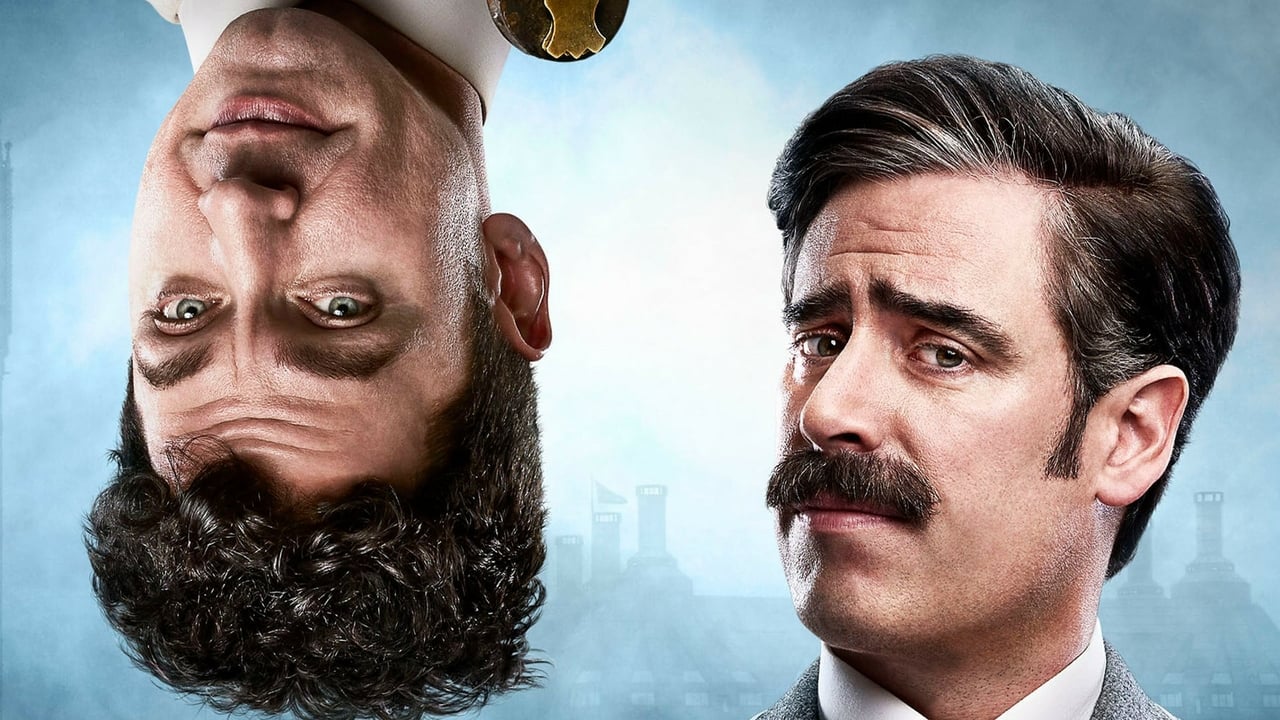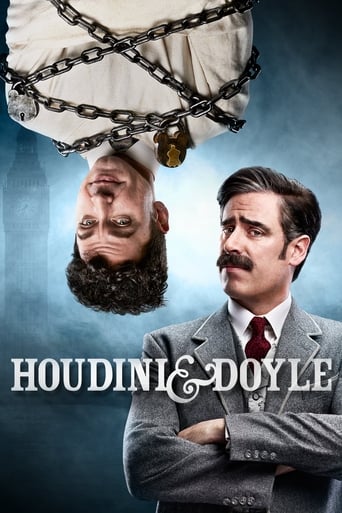



At first rather annoying in its heavy emphasis on reenactments, this movie ultimately proves fascinating, simply because the complicated, highly dramatic tale it tells still almost defies belief.
View MoreIt’s fine. It's literally the definition of a fine movie. You’ve seen it before, you know every beat and outcome before the characters even do. Only question is how much escapism you’re looking for.
View MoreMostly, the movie is committed to the value of a good time.
View MoreMostly, the movie is committed to the value of a good time.
View MoreThe series premise is that Harry Houdini and Sir Arthur Conan Doyle team up to solve crimes.The pilot episode certainly did not impress me, but I gave it a chance and watched episode two and found it just as bad.Now, the real Conan Doyle claimed that his Sherlock Holmes character was based on a Professor Bell, but I have read that he himself had the same skill at observation and deduction. The series pays little attention to this attribute.Though the actors gives it a good try, the writing is just not there.I gave this one star because there was no option for no stars.
View More(possible small spoiler)I like mystery-thrillers with a hint of the supernatural, much more so if they historical mystery-thrillers. The keys for me are simply stated. Whether it is ancient Egypt, medieval Shrewsbury, or Victoria, Australia in the 1950s, a genuine effort at setting is important. This includes not only close attention to set decoration and costuming. but also mood, lighting and music. The second key is story. All the production values in the world are meaningless if the driving narrative is trite, manipulative, or completely senseless. The latter is especially true in the case of mysteries - the solutions have to work. The third element is chemistry between the principals. Setting and narrative go to waste if the people being portrayed wouldn't really hang out together in real life.Houdini and Doyle fails on every count. And does so quite badly.Everything seems at least a tad off, from the wonderfully clean and bright London to the modern music. London in 1901 was a dirty, dark, smoky place. The Thames stank of refuse, and the city was in the grip of its famous "London fog", which was actually not fog at all, but the sulfurous, yellow fumes of the Industrial Revolution in full tilt. The H & D London is just too spic and span to be believed.As far as music is concerned, the use of jaunty tunes from what seems to be a much later period is distracting as hell. At best, the musical score feels like a hastily contrived after-thought, which, often, doesn't really fit what is happening on the screen.Contrived applies also to the story lines. To be fair, I have only seen the first 3 episodes, and I suppose it is possible that the creators saved the stronger story lines for the latter portion of the ten-part mini-series. One would hope so, as the first three mysteries didn't work at all. For example, without going into details that might spoil things, a cloud of dust in the air does not actually manifest itself into a particular recognizable face because of the workings of the subconscious mind. It really doesn't.Equally contrived is the third principal character. Women were not permitted into the Metropolitan Police Service (Scotland Yard) until 1919. Okay - so the creators threw out historic accuracy in order to throw a female character into the mix to appeal to modern audiences, but... would a woman who presumably fought and earned her way onto an all-male police force really be as helpless and deferential as portrayed here? Yeah, I get it - it's supposed to be about Houdini and Doyle, but one would expect a woman in such a situation to be a tad more formidable (see the Watson character in Elementary, for example).Somewhat related is that, even now, I can't imagine Scotland Yard would allow an American stage magician and a writer of mystery stories anywhere near their most important investigations, no matter what high-placed friends that writer might have. The basic premise makes no sense, and it is a fatal flaw.The final straw is the characterization of the principals, and the chemistry thereof. Letting go that they actually did not meet until the Roaring 20s, it is hard to understand why this particular Houdini and this particular Doyle would hang out -- they have different views, and different approaches. Doyle was an avid spiritualist - and often fooled by hoaxes (see the "Cottingley Fairies" case for one). Houdini was a an uncompromising debunker. As history shows, they only met a few times, briefly, and eventually quarreled. The characters on the show clash as well, on many levels, which is too bad. One only needs to read the excellent novel, "The List of Seven", by Mark Frost, a mystery-horror story featuring Sir Arthur as psychic investigator, to get a sense of how this project could have been both riveting and compelling - not to mention creepy. But "creepy" isn't happening here. In the end everything seems off, and very little makes sense.Later addition: Last night's episode (Episode 5 "The Curse of Korzha") was greatly improved over the previous episodes. Finally, the music was adjusted to something tolerable - opting for a "basic mystery thriller" soundtrack rather than the jarring non-historical pop they had been using. The plot was tightly packaged and actually worked! For once the solution wasn't some nonsense coming out of left field. London is still way too clean - note how clean the Thames River is, in the last few minutes of the episode. The Thames in 1901 was both garbage dump and sewer. Think about that a moment. The water would not be clear nor clean, and would have tons of... ummm.... offal floating about. Also, it is clear that the series was only allowed permission to shoot on one street, but at least in this episode they made a real effort to make it look different. Dialogue and chemistry are still problematic, but this episode marks a big step forward for this series.
View MoreA great non-factual premise completely untrue or a non-factual-sequence of events. Yes, they did know each other during the period from 1920-1940, depending upon when Doyle and Houdini died. Yet, it is "set" in Victorian England some 20 years earlier! They actually met after the death of Doyle's mother. Doyle was a Spiritualist and Houdini thought it all to be "hokum". Doyle did not consider himself a Christian! His sick (first) wife died of Tuberculosis and there is no mention, that I can find, of his sick wife's "fainting spells" or ever awakening from a coma. So, enjoy it for what it is. A highly fictional account of two charismatic characters. Very well written, quite enjoyable. A Canadian-British co-production! This is not to be confused with that other "PBS" recent "Sherlock" series. We may see anything, as Doyle also wrote science fiction about the 21st Century!
View MoreThis reminds me of Ioan Gruffudd's Forever (2014-15), an edgy, yet cozy, murder mystery story that has likable performers, and is filled with anachronisms and good taste in clothing. (Except Conan Doyle's suits, which get louder as the series goes on, a possible sign of growing confidence in the characterization of the character.) The hook is that Harry Houdini and Sir Arthur Conan Doyle have partnered to solve murders that have some connection to the supernatural and/or spiritual. It's set in the wrong time period for Houdini and Doyle to have been associated. A choice was made to make it Edwardian rather than in the more accurate 1920s. They use modern language and the modern music is intentionally unsettling. The series relies heavily on the old theater maxim of "a willing suspension of disbelief."And it's highly entertaining. The actors are personable and talented. It's definitely an ensemble cast that works well together. The sets and costumes are well done (suitable for the time period),and highly detailed. The story line doesn't explore any real substantial questions of politics, culture, war, or social values...yet. It's enjoyable, mindless entertainment, excellently done, with great potential for more robust story lines. Although the episodes might not have been filmed in the release-date order, the staging, story, and characters appeared to mature as the first season progressed.But there is one travesty: They do a disservice to a good actor, and to women everywhere, by not giving their excellent female star better billing.
View More